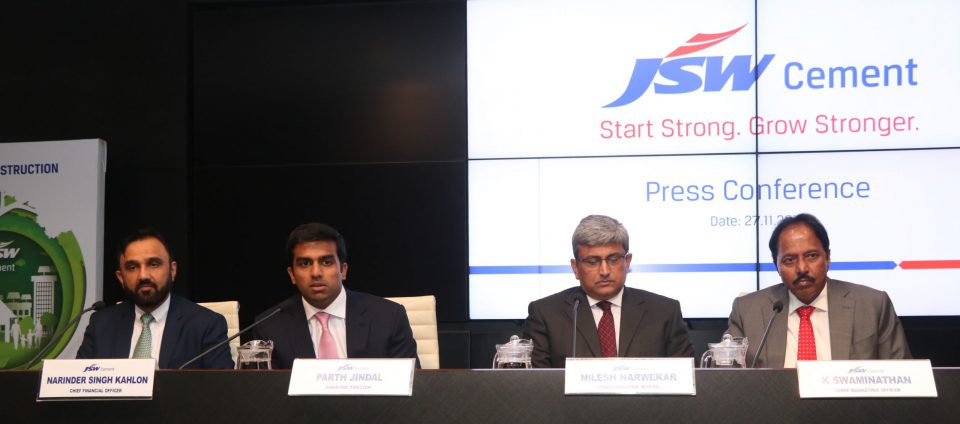Mumbai– November 27, 2019: JSW Cement Ltd, India’s leading producer of Green Cement and part of US$ 14 billion JSW Group, has received Environmental Product Declaration (EPD) by Sweden’s EPD International AB, vide EPD registration number S-P-01414, which states that its PSC cement has the lowest global warming potential in the cement industry. According to the Environmental Product Declaration received, JSW Cement’s PSC has Global Warming Potential (GWP) of 325.14 kg CO2/ MT (as compared with 760-800 kg CO2/MT of typical OPC cement and 560-650 kg CO2/MT of typical PPC cement) , which is lowest among all cement manufacturing companies in India and one of the lowest in the world[1]. The Lifecycle Assessment was independently prepared by Thinkstep Sustainability Solutions.JSW Cement converts Blast Furnace Slag from steel plants, an industrial by-product, into Cementitious products. Its flagship product, JSW Portland Slag Cement (PSC) is a blended cement that has higher final strength as compared to conventional cement products available in the market and is also resistant to chemical attacks. JSW PSC with its lower clinker ratio helps conserve natural resource viz. Limestone, solid fuel viz. Coal & Pet coke, and water. It also consumes least amount of electrical energy compared to all other types of cement products in the Indian market.
Currently, JSW Cement is ranked among India’s Top 10 cement companies with a manufacturing footprint across West, South and East regions of India. This enables the company to service customer needs for green cement in these regions. It has a vision to grow its cement manufacturing capacity to 25 MTPA by 2023. This is a quantum increase of its earlier capacity target by 25% and is aimed at capitalizing on the growing cement demand in the country. Upon achieving this capacity target, JSW Cement will rank among top 5 cement companies in India.
According to Mr Parth Jindal, Managing Director of JSW Cement, “The EPD International certification endorses our strategy of combining growth with environmentally sustainable operations. Green material is taking centerstage driven by increasing focus on sustainable infrastructure development in India. As part of our strategy to play a significant role in India’s Infrastructure growth story, we are revising our overall cement capacity targets to 25 MTPA by 2023. Upon completion of this capacity expansion, we will rank among top 5 Indian cement companies.”
JSW Cement’s current capacity is 14 MTPA. One of the key enablers of its targeted 25 MTPA capacity growth are various projects being undertaken at its subsidiary, Shiva Cement Ltd, in Odisha. JSW Cement currently owns 54% of Shiva Cement, with the majority purchase made in March 2017 from former promoters and balance acquired through open market purchases from ACC Ltd. Since Shiva Cement is located in a limestone rich area, its mining resources will support JSW Cement’s growth in the Eastern region. In the last three years, the company has made substantial progress in acquiring land (land for manufacturing and mining operations), obtaining government approvals and securing support of local people to achieve its growth targets. Recently, Shiva Cement received Consent to Establish (CTE) approval for expanding its mines from 0.12 MTPA to 0.345 MTPA. The Environmental Clearance (EC) has also been received for expanded clinker and cement production. Moreover, earlier this month, Shiva Cement was declared as the preferred bidder for the Khatkurbahal (North) Limestone Block via e-auction process. This block is adjacent to its existing mine.
The availability of Limestone from the existing and new block will support the company’s plans to establish ~1 MTPA clinker unit at Shiva Cement. This clinker unit will also supply the raw material to JSW Cement’s manufacturing plant at Salboni in West Bengal and Jajpur in Odisha. JSW will also add ~1 MTPA grinding capacity at Shiva Cement. The clinker and grinding projects at Shiva Cement will be established with a capital investment of Rs 800 crores planned over four years from FY20 to FY23.
In addition to the expansion projects planned at Shiva Cement, JSW Cement will undertake capacity ramp up across South, West and East regions to reach 25 MTPA targeted capacity.
- In South, the company plans to add 3.6 MTPA capacity to take its overall green cement capacity to 11.6 MTPA. The capacity expansion at its unit in Toranagallu, Karnataka comprises debottlenecking and installation of a new VRM grinding unit to take its capacity to 6 MTPA from existing 3.2 MTPA. It also plans to put up a new grinding unit of 0.8MTPA capacity at Salem in Tamilnadu
- In West, JSW Cement plans to add 2.4 MTPA taking its overall cement capacity to 4.6 MTPA. The new capacity is entirely being set-up at its manufacturing unit in Dolvi, Maharashtra, through debottlenecking and a new VRM.
- In East, it is adding the largest chunk of production capacities of over 5 MTPA taking its capacity to 9.0 MTPA. The capacity ramp up will be at its manufacturing units at Salboni, West Bengal where the company will add 2.4 MTPA, Jajpur, Odisha facility with an addition of 1.8 MTPA alongwith ~1 MTPA capacity addition at Shiva Cement in Odisha.
JSW Cement’s aggressive ramp up in capacity will entail a capex investment of approximately Rs 2,875 crores (including the planned capex at Shiva Cement Ltd). It plans a combination of debt and internal accruals to raise these funds.
The growth opportunity for PSC cement is visible in the number of infrastructure projects that now uses JSW’s PSC cement across India. The company is becoming a preferred green cement supplier for most of these projects. JSW Cement supplies to these infrastructure projects among many others.
| West Region | · Mumbai Metro
· MBPT Oil Berth Jetty |
| East region | · Kolkata Metro Rail
· RVNL · West Bengal State Electricity Transmission · West Bengal Police Housing · Coal India Project |
| South Region | · APTIDCO
· APGENCO Power Project · Krishnapatnam Port · NCC Power Project · AP State Housing Projects |
About JSW Cement Ltd: JSW Cement Ltd is part of US$14 billion JSW Group Indian conglomerate with interests in Steel, Energy, Infrastructure, Cement, Private Equity, Furniture and Paints. JSW entered the cement market in 2009 with a vision to ensure a sustainable future for the country by producing eco-friendly cement, using industrial by-products such as slag. Its manufacturing units at Vijayanagar in Karnataka, Nandyal in Andhra Pradesh, Salboni in West Bengal, Jajpur in Odisha and Dolvi in Maharashtra utilize slag from Steel manufacturing units to produce Portland Slag Cement and Ground Granulated Blast Furnace Slag (GGBS). Through its innovative conversion of industrial by-product into a useful end-product, JSW Cement greatly helps reduce the carbon footprint of JSW Group.

